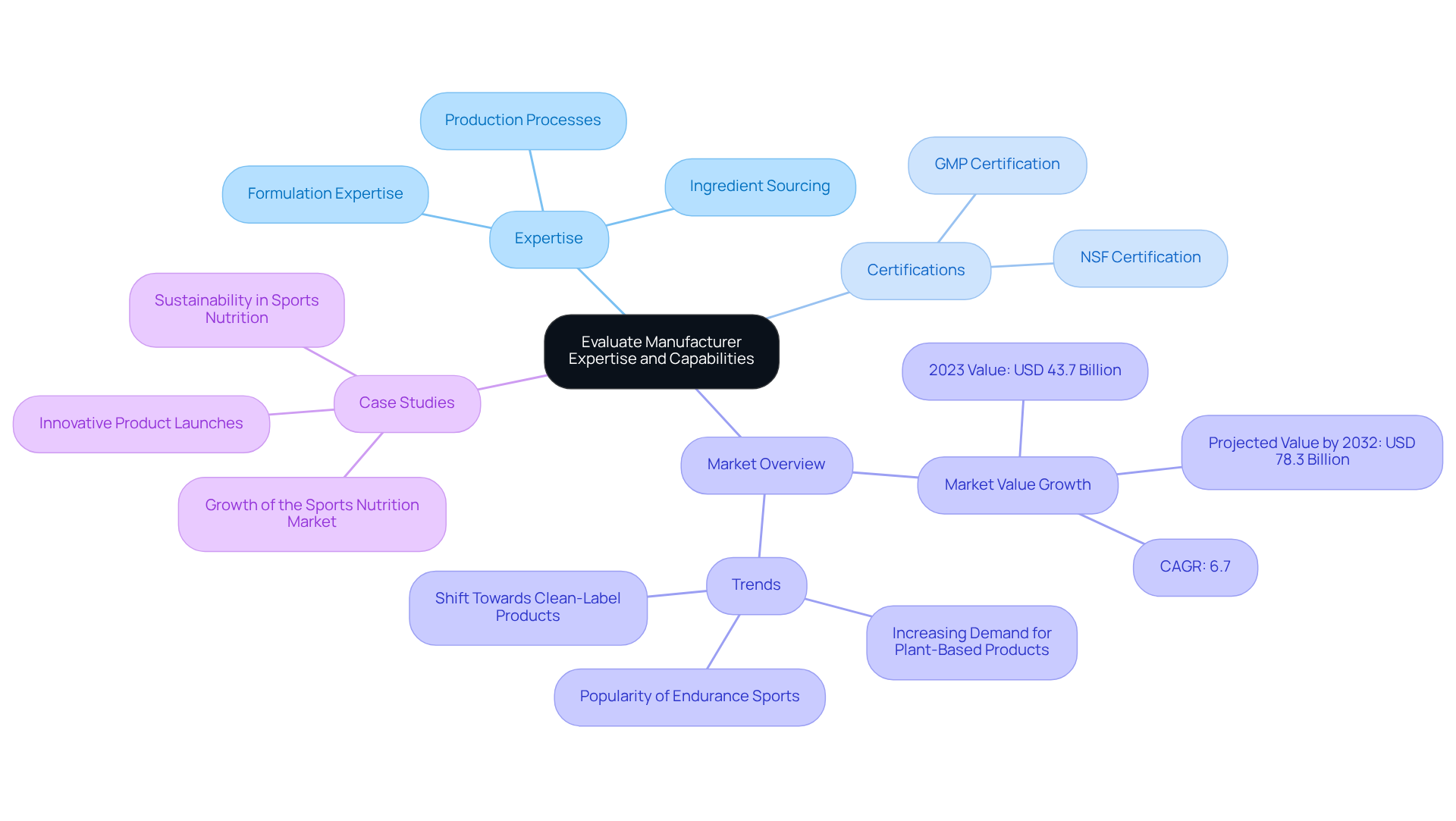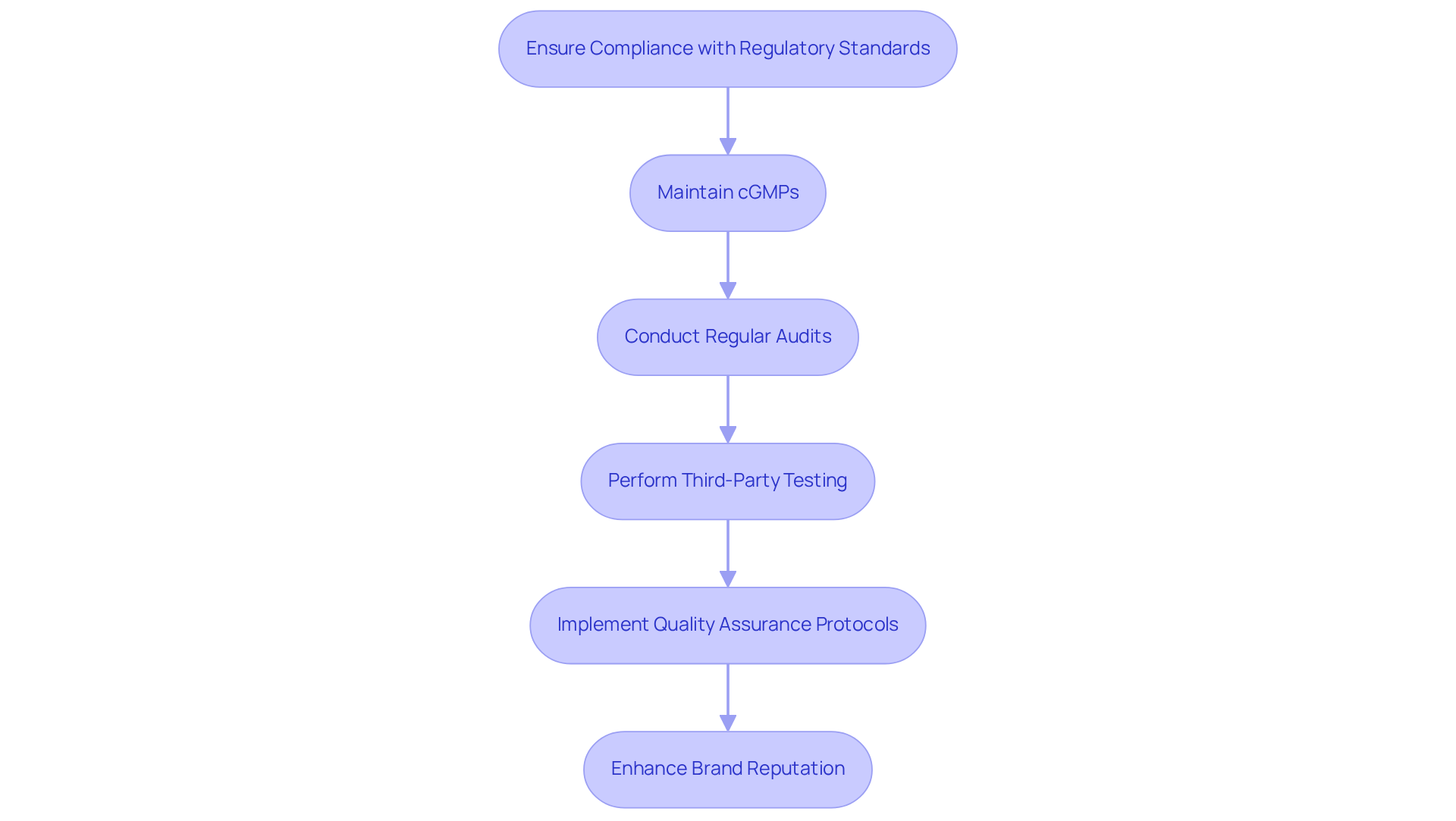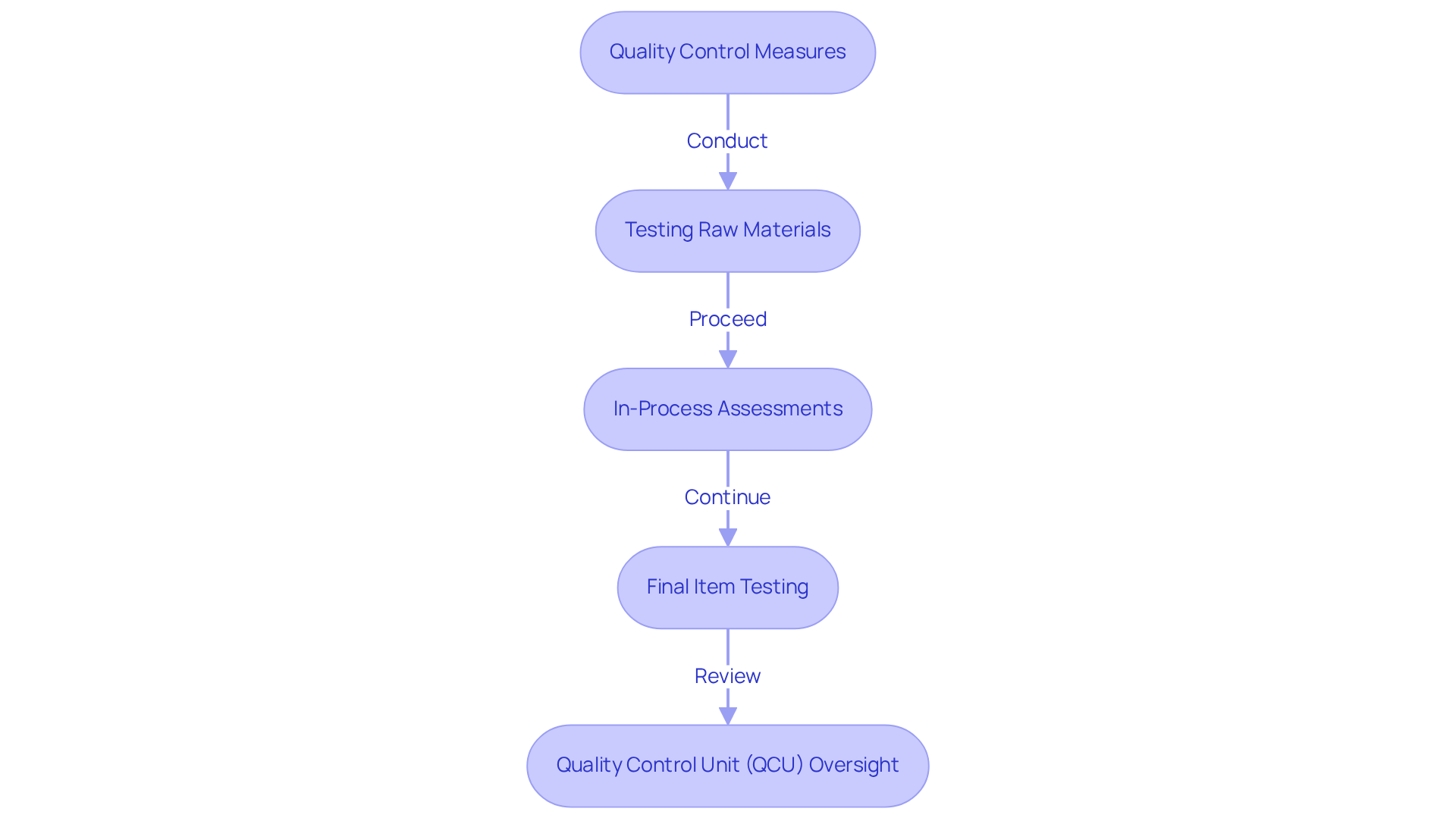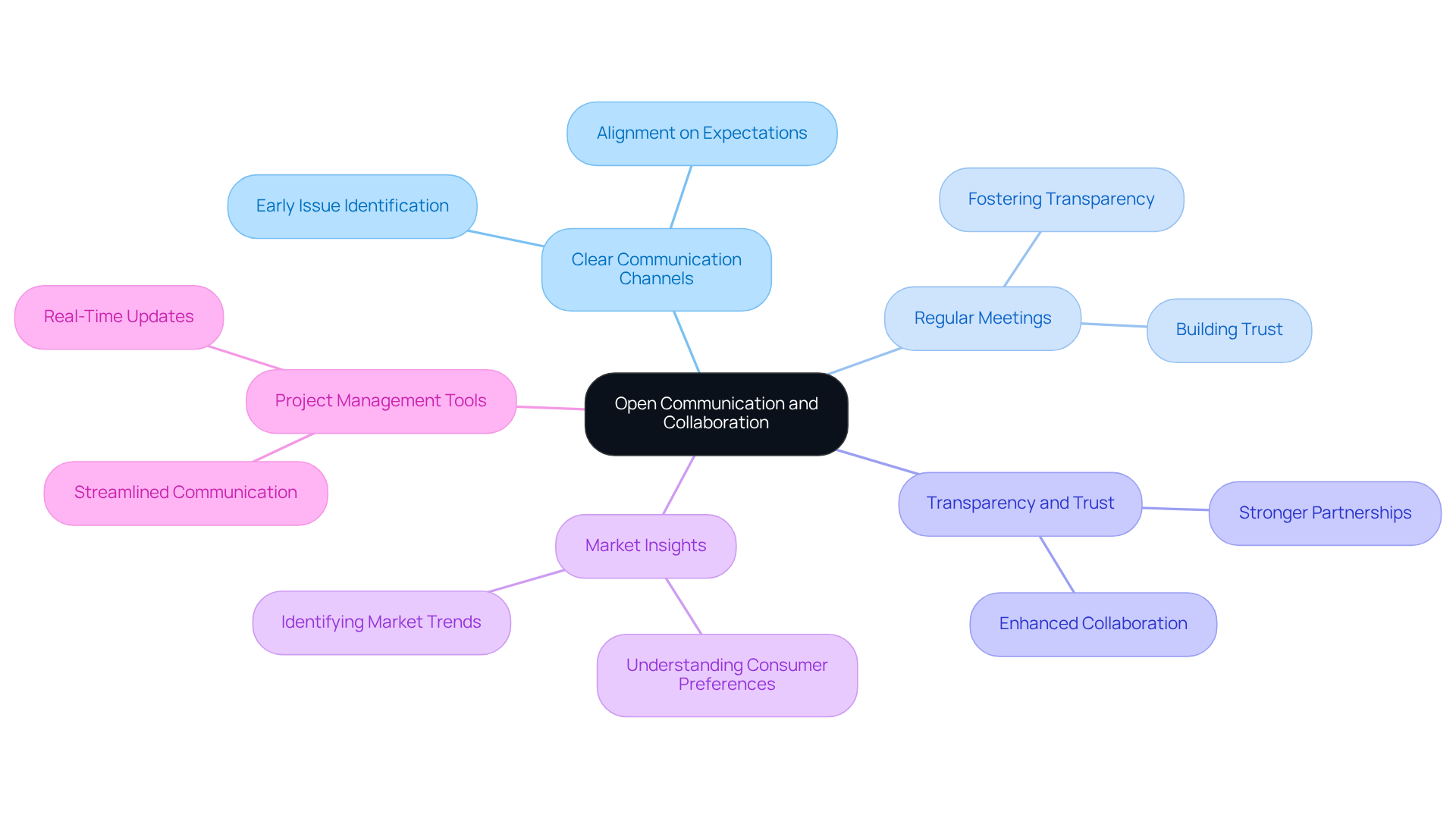Overview
The four key practices for sports supplement manufacturers are pivotal in establishing expertise and ensuring success in the competitive landscape.
- Evaluating expertise and capabilities is essential; this foundation enables manufacturers to deliver high-quality products.
- Ensuring compliance with regulatory standards, including adherence to guidelines like cGMP, is non-negotiable for maintaining product safety and meeting industry regulations.
- Implementing robust quality control measures is crucial, as it enhances consumer trust and drives innovation.
- Fostering open communication and collaboration among stakeholders is vital for effective partnerships.
These practices are not merely recommendations; they are essential strategies for thriving in the growing sports nutrition market, as rigorous testing and compliance with industry standards are critical for long-term success.
Introduction
The booming sports nutrition market, projected to surge from USD 43.7 billion in 2023 to USD 78.3 billion by 2032, presents a wealth of opportunities for manufacturers.
To thrive in this competitive landscape, sports supplement manufacturers must adopt key practices that not only ensure compliance with stringent regulations but also enhance product quality and foster collaboration with brands.
However, with the increasing scrutiny from regulatory bodies and evolving consumer demands, manufacturers face significant challenges.
How can they effectively navigate these complexities while positioning themselves for success? The answer lies in strategic adaptation and a commitment to excellence.
Evaluate Manufacturer Expertise and Capabilities
When selecting , it is imperative to thoroughly assess their expertise and capabilities. Seek out sports supplement manufacturers that have a robust background in nutraceuticals, particularly those specializing in sports nutrition. Evaluate their production processes, ingredient sourcing, and formulation expertise. For instance, a producer experienced with specific ingredients known for enhancing athletic performance can provide a significant competitive edge.
Additionally, consider the certifications of sports supplement manufacturers, such as GMP (Good Manufacturing Practices) and NSF certification, as these indicate compliance with industry standards and ensure safety and quality. Engaging with sports supplement manufacturers who have a proven track record of successful launches can also provide valuable insights into their operational capabilities and reliability.
Notably, the global sports nutrition market was valued at USD 43.7 billion in 2023 and is projected to reach USD 78.3 billion by 2032, growing at a CAGR of 6.7% during this period. This growth underscores the urgency for producers to establish their expertise to seize market opportunities. Furthermore, the increasing demand for plant-derived protein powders and supplements reflects shifting consumer preferences, while the rising popularity of endurance sports highlights the necessity for specialized sports nutrition products.
Real-world examples showcase brands that have effectively partnered with producers recognized for their innovative formulations, resulting in increased market share and consumer trust.

Ensure Compliance with Regulatory Standards
Sports supplement manufacturers must comply with stringent regulatory standards, especially the FDA's guidelines for dietary supplements. Central to these regulations is the maintenance of Current Good Manufacturing Practices (cGMPs), which ensure that all ingredients are safe, accurately labeled, and meet established standards. A robust compliance program is essential for sports supplement manufacturers, incorporating regular audits and third-party testing to verify adherence to these standards. Sports supplement manufacturers that implement rigorous quality assurance protocols not only meet regulatory requirements but also enhance their brand reputation among consumers.
The dietary product industry has seen a notable increase in FDA observations, with a 46% rise from 1,083 in 2023 to 1,578 in 2024, underscoring the escalating scrutiny on compliance. It is crucial for sports supplement manufacturers to remain vigilant regarding regulatory changes, particularly those related to labeling and health assertions, to avoid penalties and ensure consumer safety. Dietary product labels must include a domestic address or phone number for reporting serious adverse events.
Collaborating with legal experts or compliance consultants, such as cGMP Consulting Inc., which provides services like Gap Assessments and Internal Audits, can significantly strengthen a manufacturer's compliance framework. This partnership offers valuable insights to effectively.

Implement Robust Quality Control Measures
Implementing robust quality control measures stands as a cornerstone of successful sports supplement manufacturers. This involves thorough , in-process assessments during production, and final item testing prior to distribution. Sports supplement manufacturers must establish a Quality Control Unit (QCU) that oversees these processes and ensures compliance with cGMP standards.
For instance, sports supplement manufacturers that engage in third-party testing provide additional assurance to consumers regarding product safety and efficacy. Real-world examples illustrate that brands with transparent control practices often cultivate greater consumer trust and loyalty. Notably, statistics reveal that 20-50% of athletes may not consistently utilize third-party tested products, underscoring the critical role such testing plays in establishing consumer confidence.
Furthermore, the FDA has indicated that 40% of dietary aid companies examined lacked proper specifications, highlighting the urgent need for sports supplement manufacturers to prioritize control measures. Additionally, additive oversight represents a steadfast commitment that requires ongoing evaluation, enhancement, and innovation.
Leveraging technology such as batch tracking and automated testing can significantly boost the efficiency and reliability of control processes, ensuring that products consistently meet high safety and effectiveness standards. Clarity and traceability within the industry are also paramount, as they foster consumer trust and underscore a brand’s commitment to quality.

Foster Open Communication and Collaboration
Effective collaboration and open communication between sports supplement manufacturers and brands are pivotal for achieving success in the nutraceutical sector. Establishing clear communication channels enables early identification of potential issues, ensuring alignment on expectations and timelines. Regular meetings and updates foster transparency and build trust—elements that are essential for a productive partnership. Brands that collaborate closely with their producers often gain valuable insights into market trends and consumer preferences, facilitating more effective development of their offerings. Moreover, utilizing project management tools can streamline communication further, providing real-time updates and feedback that enhance collaboration. This proactive approach not only boosts operational efficiency but also solidifies the partnership between manufacturers and brands, ultimately leading to and improved success in the competitive sports nutrition market.

Conclusion
Selecting the right sports supplement manufacturer is crucial for success in a rapidly evolving market. By evaluating the expertise and capabilities of potential partners, ensuring compliance with regulatory standards, implementing robust quality control measures, and fostering open communication, brands can position themselves to thrive in the competitive landscape of sports nutrition.
Key insights from the article highlight the importance of:
- Assessing manufacturers' backgrounds in nutraceuticals
- Maintaining rigorous compliance programs to meet FDA guidelines
- Prioritizing quality control practices that enhance consumer trust
Effective collaboration between manufacturers and brands can lead to innovative product development, ultimately driving market success.
As the global sports nutrition market continues to grow, manufacturers must adapt to changing consumer preferences and regulatory demands. By embracing these best practices, stakeholders in the sports supplement industry can ensure product safety and efficacy while building lasting relationships that lead to sustained growth and consumer loyalty. Taking proactive steps today will pave the way for a successful future in this dynamic sector.
Frequently Asked Questions
Why is it important to evaluate the expertise of sports supplement manufacturers?
Evaluating the expertise of sports supplement manufacturers is crucial to ensure they have a robust background in nutraceuticals and sports nutrition, which can provide a competitive edge in product formulation and ingredient sourcing.
What certifications should I look for in sports supplement manufacturers?
Look for certifications such as GMP (Good Manufacturing Practices) and NSF certification, as these indicate compliance with industry standards and ensure safety and quality in the manufacturing process.
How can a manufacturer’s track record affect my decision?
Engaging with manufacturers that have a proven track record of successful product launches can provide valuable insights into their operational capabilities and reliability, which is important for business success.
What is the current market value of the global sports nutrition market?
The global sports nutrition market was valued at USD 43.7 billion in 2023 and is projected to reach USD 78.3 billion by 2032, growing at a CAGR of 6.7% during this period.
What trends are influencing the sports nutrition market?
The increasing demand for plant-derived protein powders and supplements, along with the rising popularity of endurance sports, reflects shifting consumer preferences and highlights the need for specialized sports nutrition products.
Can you provide examples of successful partnerships in the sports supplement industry?
Real-world examples showcase brands that have effectively partnered with producers recognized for their innovative formulations, resulting in increased market share and consumer trust.




